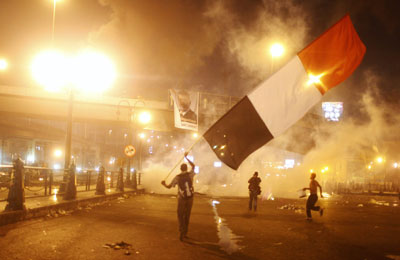
Clashes return to streets of Cairo in new blow for Egypt
Cairo, July 16, 2013
Egyptian police and protesters clashed in central Cairo early on Tuesday after fights broke out between supporters of ousted Islamist President Mohamed Mursi and locals angered when they tried to block major thoroughfares crossing the River Nile.
The Mena state news agency said at least 22 people were injured in the violence, which began just after 9 p m (1900 GMT) on Monday and lasted into the early hours of Tuesday.
The clashes were smaller and more localised than the earlier deadly unrest since Mursi was deposed by the military on July 3, and most of Cairo was unaffected.
Still, after a week of relative calm, scenes of running street battles close to the Egyptian Museum, one of the country's main tourist attractions, may raise further concerns about stability in the Arab world's most populous country.
"I've had enough of this chaos," said Ashraf Mohamed, who watched the clashes from a distance. "Egypt is just rubbish."
Young men, their mouths covered to protect them from tear gas, threw stones at police and shouted pro-Mursi and anti-military slogans, as well as "Allahu Akbar!" (God is greatest).
Military helicopters hovered overhead and police vans were brought in to quell the trouble, but when that didn't work, dozens of riot police moved in. Medics treated men with deep gashes to their eyes and faces nearby.
Mohamed's frustration echoed the view of millions of Egyptians who rallied for Mursi's resignation on June 30. The military said it deposed him to fulfil the wish of the people. Mursi's Muslim Brotherhood movement said it was a coup.
Egypt has become increasingly polarised by the crisis, but one thing the two sides share is a deep mistrust of the United States and its perceived role in the unrest.
BURNS SPURNED?
US Deputy Secretary of State William Burns told reporters in Cairo that Washington had no desire to meddle in Egypt, which it supports with $1.5 billion in aid each year, most of which goes to the military.
"Only Egyptians can determine their future," Burns told reporters at the US embassy. "I did not come with American solutions. Nor did I come to lecture anyone. We will not try to impose our model on Egypt."
Washington, never comfortable with the rise of the Islamist Brotherhood, has so far refused to say whether it views Mursi's removal as a coup, which would require it to halt aid.
The Islamist Nour Party and the Tamarud anti-Mursi protest movement both said they turned down invitations to meet Burns.
But a senior State Department official denied Burns had been shunned. "I don't think we're losing influence at all," the US official said, adding that Burns was still in Cairo.
"I don't know what meetings he has, but he has seen a range of people in Cairo in the interim government, in civil society ... so it's hard to say he has been spurned by both sides. I don't accept that is the case."
MARCHES IN CAIRO
Tens of thousands of Brotherhood supporters gathered late on Monday at the Rabaa Adawiya mosque in northeastern Cairo, where they have staged a sit-in vigil for the last three weeks vowing to stay until Mursi is reinstated.
Another large crowd rallied outside Cairo University, and there were protests in the coastal city of Alexandria and the Nile city of Assiut. There also were minor clashes in Giza, home of the pyramids, just outside Cairo.
The army warned demonstrators that it would respond with "the utmost severity and firmness and force" if they approached military bases or "vital state institutes."
At least 92 people were killed in the days after Mursi was toppled, more than half of them shot by troops outside the Republican Guard compound near the Rabaa mosque on July 8. Protests since then had been tense but peaceful until Monday night.
The political turmoil and unrest in major cities has also fuelled violence in Egypt's lawless North Sinai province bordering Israel and the Palestinian Gaza Strip.
Attacks in the area have killed 13 people, mainly police, since July 3. In the latest, suspected Islamist militants fired grenades at a bus carrying workers from a factory in the Sinai city of El Arish on Monday, killing three and wounding 17.
US CALLS FOR RESTRAINT
Mursi is being held incommunicado at an undisclosed location. He has not been charged with a crime but the authorities say they are investigating him over complaints of inciting violence, spying and wrecking the economy. Scores of Mursi supporters were rounded up after violence last week.
Many of the top Brotherhood figures have been charged with inciting violence, but have not been arrested and are still at large. The public prosecutors' office announced new charges against seven Brotherhood and Islamist leaders on Monday. - Reuters







